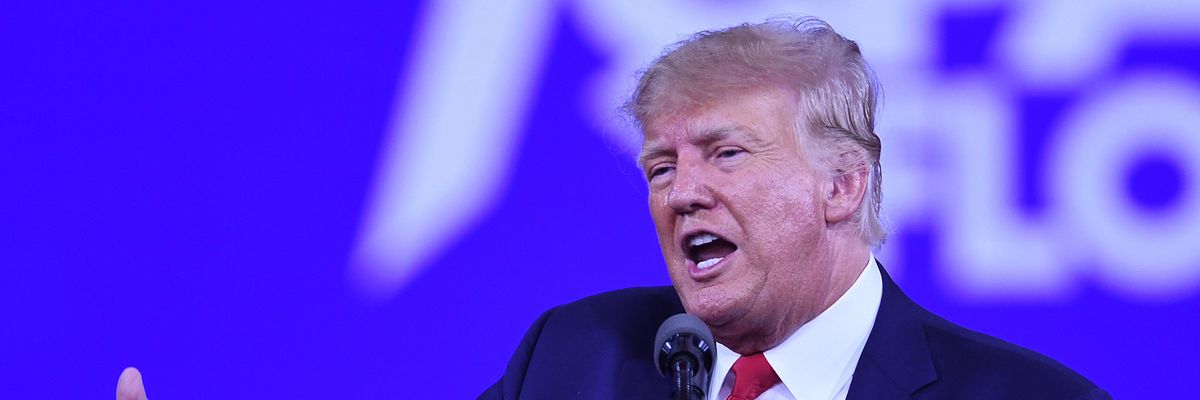As I write this column on February 27, 2022, President Vladimir Putin has put his nuclear deterrence forces into high alert.
Only five days ago, on February 22, Trump called Putin "savvy" and his flagrant violation of international law "genius."
"You gotta say, that's pretty savvy," Trump said the day after Putin illegally declared two regions of Ukraine to be independent countries and thereby created a false pretext for an imminent and unprovoked invasion. "This is genius," Trump added. "Putin declares a big portion of the Ukraine ... Putin declares it as independent. Oh, that's wonderful."
At a Mar-a-Lago fundraiser the following evening, he doubled-down: "They say, 'Trump said Putin's smart.' I mean, he's taking over a country for two dollars' worth of sanctions. I'd say that's pretty smart. He's taking over a country--really a vast, vast location, a great piece of land with a lot of people, and just walking right in."
Even as casualties mounted while Ukraine fought for its life on Saturday night, February 26, 2022, Trump again told a large Conservative Political Action Conference (CPAC) audience that Putin was "smart."
Trump's comments generated widespread shock and outrage--except from fellow Republicans, including those who cheered him last night at CPAC. His praise for the ruthless dictator should not have surprised anyone. For years, Trump has helped Putin advance his most important objective: rebuilding the former Soviet Union.
Putin's Mission
Putin's April 2005 state of the nation address revealed the guiding principle of his reign: "First and foremost, it is worth acknowledging that the demise of the Soviet Union was the greatest geopolitical catastrophe of the century. As for the Russian people, it became a genuine tragedy. Tens of millions of our fellow citizens and countrymen found themselves beyond the fringes of Russian territory."
At the time Putin gave that speech, some of the people he referred to as his "countrymen" had been citizens of newly independent nations for more than a decade. A few of those former Soviet satellites had even become members of NATO--the European security pact that was created to counter Soviet aggression. For more than 70 years, NATO has helped the continent avoid a major war.
Putin wants them back and, more importantly, he wants the land they occupy. If he can sow discord among NATO allies, all of Eastern Europe--including Ukraine--becomes a softer target. That's where Trump comes in.
Trump's Assistance
Trump has happily obliged the Russian benefactor whose support he embraced during the 2016 election. His open and notorious praise for Putin personally has been unwavering. Trump also tried to undermine NATO.
For example, at an April 2, 2016 campaign appearance in Racine, Wisconsin, he called NATO "obsolete." Member countries had to pay their fair share, he said, and if they didn't, "they have to get out. And if it breaks up NATO, it breaks up NATO."
Shortly before accepting the Republican nomination for president in July 2016, Trump told the New York Times that whether he would come to the aid of NATO countries facing Russia's most immediate threats, especially the former Soviet Union's Baltic States, depended on whether those countries were fulfilling their financial obligations to the pact. The simple fact is that many countries who need NATO protection the most simply can't afford to pay more.
Presidents George W. Bush and Barack Obama pressed NATO allies to increase military spending. But no American president has ever imposed such a condition on the United States' mutual defense obligation under NATO.
On July 10, 2018, as Trump departed for the annual NATO summit in Brussels, followed by a trip to London and a summit with Putin in Helsinki, he said, "I have NATO, I have the UK, which is in somewhat turmoil, and I have Putin. Frankly, Putin may be the easiest of them all. Who would think? Who would think?"
Then he opened the NATO summit on July 11, 2018, by demanding once again that all NATO countries increase their financial contributions to the pact. He reiterated that demand in London.
Then he met with Putin in Helsinki where they breached diplomatic protocol and held a private two-hour session with no aides present. We still don't know what they discussed then or in their numerous private conversations throughout Trump's presidency. We do know that Trump confiscated the U.S. interpreter's notes of their July 7, 2017 session in Hamburg, Germany.
Perhaps one of their conversations concerned Putin's displeasure at being ousted from what was then the G8--eight of the world's most powerful leaders--in retaliation for his 2014 annexation of Crimea. As host of the 2020 summit, Trump wanted to invite Putin back in, saying, "I don't feel that as a G7 it properly represents what's going on in the world... It's a very outdated group of countries."
Trump's Second Term?
And then there's this from Washington Post reporters Carol Leonnig and Philip Rucker in their recent book, "I Alone Can Fix It: Donald J. Trump's Catastrophic Final Year":
Trump had privately indicated that he would seek to withdraw from NATO and to blow up the U.S. alliance with South Korea, should he win reelection. When those alliances had come up in meetings with [Defense Secretary Mark] Esper and other top aides, some advisers warned Trump that shredding them before the election would be politically dangerous.
"Yeah, the second term," Trump had said. "We'll do it in the second term."
Even as some Republicans criticize Putin's invasion while also trying to blame President Joseph Biden for the war, the GOP remains silent about Trump's willingness to genuflect before an autocrat who is ruthless with his enemies, territorially aggressive with his neighbors, and committing what may be war crimes against innocent people. That's worth remembering for the 2022 midterm elections.
As for that "second term," if Trump runs and retakes the presidency, he'll be not only Putin's most dangerous fan, but also his most powerful.

